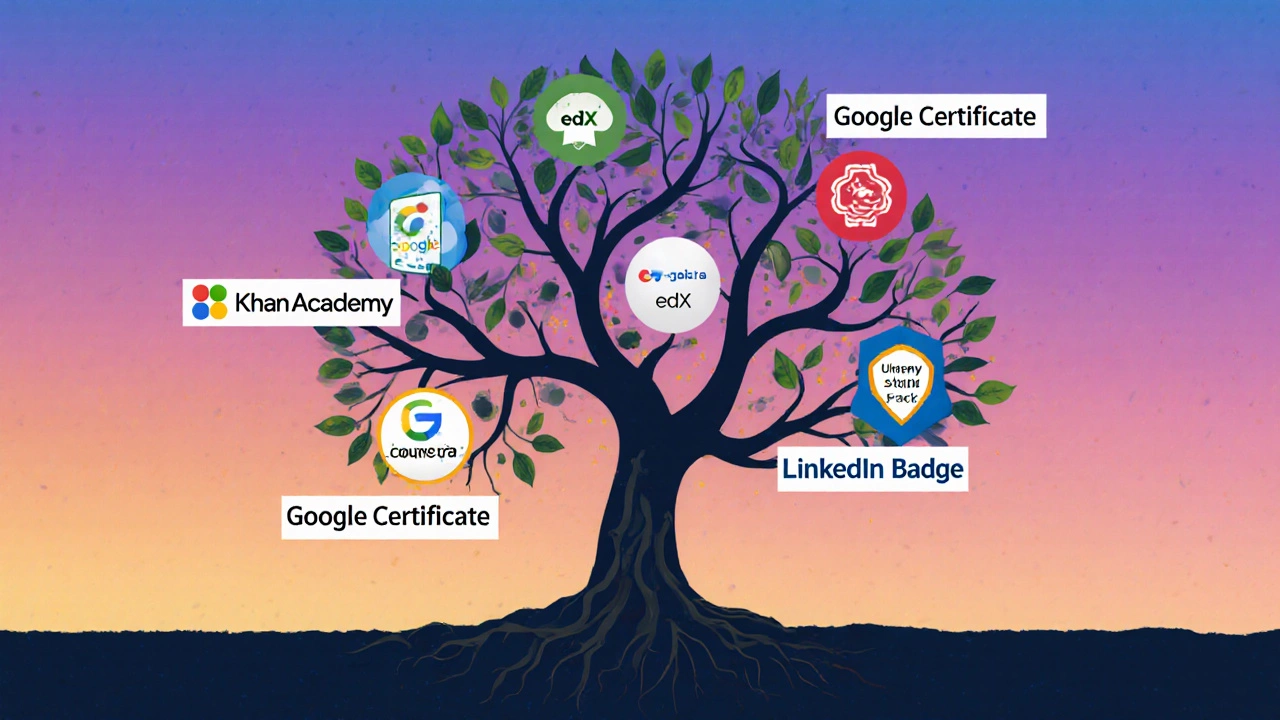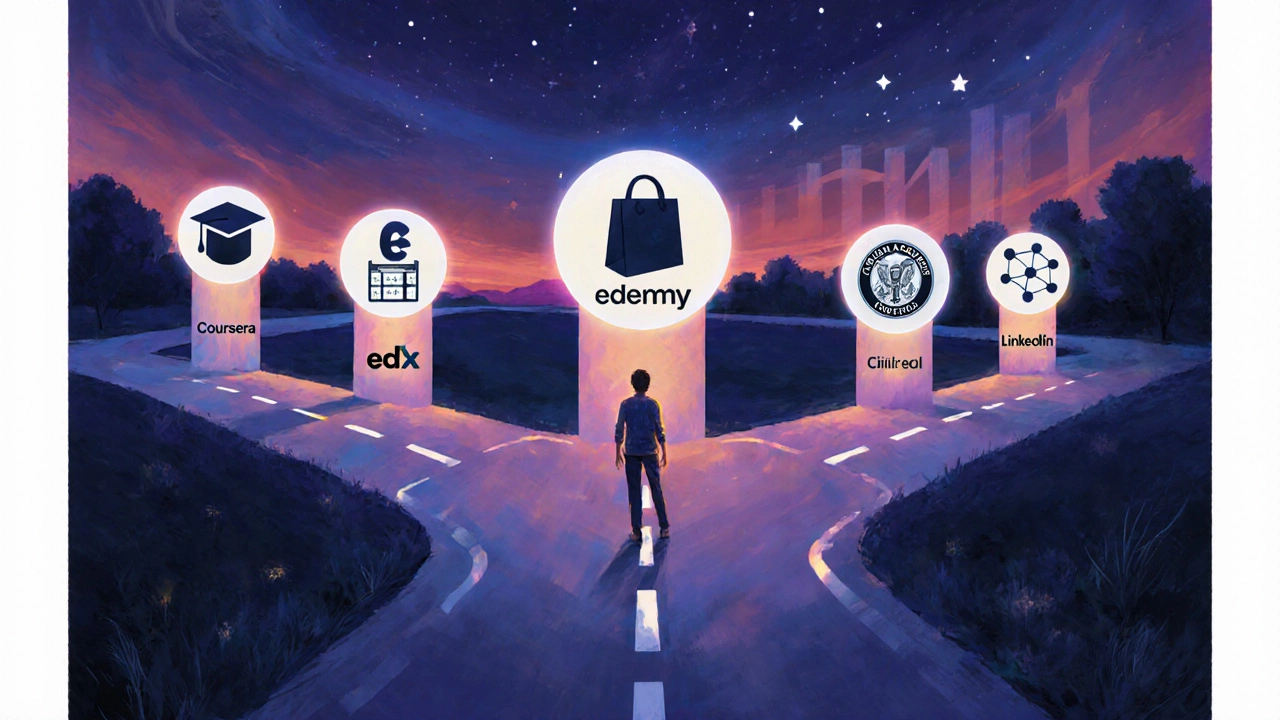Who Is the Best for Online Classes? Top Platforms Compared for 2025

Online Learning Platform Selector
Find Your Perfect Learning Platform
Answer these questions to get a personalized recommendation based on the latest 2025 platform comparison.
If you're looking for the best online classes, you're not alone. Millions of people worldwide are switching to online learning - whether they're upskilling for a promotion, switching careers, or just trying to learn something new. But with so many platforms out there, picking the right one feels overwhelming. Which one actually delivers results? Which one won’t waste your time or money? This isn’t about who has the fanciest website. It’s about who gives you real skills, real support, and real value.
What Makes a Platform Truly the Best?
There’s no single answer to "who is the best for online classes?" because the best platform depends on what you want to learn and why. Some people need certification to get a job. Others just want to understand how to code a website. A few are preparing for competitive exams. The right platform matches your goal, not just your budget.
Here’s what actually matters when you’re choosing:
- Course quality: Are the instructors industry professionals or just content creators?
- Recognition: Will employers or institutions take your certificate seriously?
- Structure: Is it self-paced, or does it have deadlines and live sessions?
- Support: Can you ask questions? Get feedback? Join a community?
- Cost: Is it a one-time fee, subscription, or free with paid upgrades?
Many platforms sound great on ads. But only a few consistently deliver on these five points.
Coursera: The University-Backed Choice
If you want credentials that employers recognize, Coursera is the strongest option. It partners with over 300 universities and companies - including Stanford, Yale, Google, and IBM. You won’t just get a certificate. You’ll get one that says it was created by a real university department.
For example, Google’s IT Support Professional Certificate on Coursera has helped over 100,000 people land entry-level tech jobs in the U.S. alone. The course takes about six months at 10 hours a week. It costs $49 a month, but you can apply for financial aid if you can’t afford it.
Coursera also offers full online degrees from universities like the University of London and the University of Illinois. These aren’t bootcamps - they’re accredited programs that count like traditional degrees. The downside? They’re expensive. A full master’s can cost $15,000-$25,000.
Best for: Professionals seeking accredited certificates, career changers, degree seekers.
Udemy: The Marketplace for Everything
Udemy has over 215,000 courses on every topic you can imagine - from Python programming to how to make sourdough bread. The catch? Anyone can create a course. That means quality varies wildly.
But here’s the trick: Udemy runs constant sales. Most courses drop from $200 to under $15. That makes it easy to try something risky without losing much. You can buy a course on digital marketing, then another on Excel, then one on public speaking - all for less than $50 total.
Look for courses with 4.5+ ratings and at least 10,000 students. Check the instructor’s profile. Are they actually working in the field? Do they have real projects to show? Avoid courses with no reviews or just five reviews from fake accounts.
Udemy doesn’t offer accredited certificates. But if you’re learning for personal growth or to build a portfolio, it’s unbeatable for price and variety.
Best for: Hobbyists, skill explorers, budget learners, people who want to test topics before committing.
edX: The Nonprofit Alternative
Founded by Harvard and MIT, edX started as a nonprofit experiment in free education. Today, it still carries that mission. You can audit most courses for free - meaning you get full access to videos, readings, and quizzes. You just won’t get a certificate unless you pay.
Its strength is academic rigor. Courses from MIT, Berkeley, and Harvard are often harder than their on-campus versions. If you’re serious about learning computer science, economics, or data analysis, edX gives you the same material as elite universities - without the tuition.
The certificates cost $50-$300, depending on the course. But they’re respected by employers, especially in tech and research. edX also offers MicroMasters programs - graduate-level sequences that can count toward a full master’s degree at partner universities.
Best for: Students, academics, people who want university-level learning without enrolling in a degree.

Khan Academy: Free, Simple, and Reliable
If you’re learning math, science, or basic computer skills, Khan Academy is the quiet giant. It’s completely free. No ads. No upsells. No login required to access most content.
It’s not for advanced professionals. But if you’re struggling with algebra, biology, or introductory programming, Khan Academy breaks it down better than any textbook. Its video lessons are short, clear, and paced for beginners. The practice exercises give instant feedback.
It’s used by millions of students globally - including in Australia, where schools often recommend it for Year 9-12 math and science revision. It’s also a go-to for parents helping kids with homework.
Best for: Students, parents, beginners, anyone who needs foundational knowledge without spending a cent.
LinkedIn Learning: For Career Growth
LinkedIn Learning (formerly Lynda.com) is built into your professional network. If you’re on LinkedIn, you’ll see course recommendations based on your job title, skills, and connections.
Its courses focus on soft skills and tools used in business: Excel, project management, communication, leadership, and Adobe Creative Suite. The instructors are often industry trainers or corporate consultants.
The big advantage? When you finish a course, it automatically adds it to your LinkedIn profile. That means recruiters can see your new skills without you having to update your resume manually.
It’s subscription-only - $29.99/month or $299/year. But if you’re actively job hunting or climbing the corporate ladder, that monthly cost pays for itself with one new skill.
Best for: Professionals, corporate workers, job seekers, people who want to boost their LinkedIn profile.
Choosing Based on Your Goal
Here’s a quick guide to match your goal with the right platform:
| Your Goal | Best Platform | Why |
|---|---|---|
| Get a recognized certification for a job | Coursera | Offers employer-recognized certificates and degrees |
| Learn a new skill cheaply and quickly | Udemy | Massive library, frequent sales, instant access |
| Study like a university student without enrolling | edX | Free access to MIT, Harvard, and other top schools |
| Master basics in math, science, or coding | Khan Academy | 100% free, no distractions, perfect for beginners |
| Grow your career and impress recruiters | LinkedIn Learning | Auto-adds skills to your LinkedIn profile |

What to Avoid
Don’t fall for platforms that promise "get rich quick" with a single course. No one becomes a data scientist after watching five videos. Real learning takes time, practice, and repetition.
Avoid platforms that don’t let you preview content before buying. If you can’t see a sample lesson, you’re gambling.
And never sign up for a subscription unless you’re sure you’ll use it. Many people pay for Coursera or LinkedIn Learning for a month, then forget about it. Cancel before the trial ends if you’re not engaged.
Final Tip: Start Free, Then Invest
Try this approach: Use Khan Academy or edX to explore a topic for free. If you like it, move to Coursera or Udemy for a certificate. If you’re using it for work, add LinkedIn Learning to show it off.
The best online class isn’t the most expensive. It’s the one you actually finish.
Is Coursera worth the money?
Yes, if you need a credential employers recognize. Coursera’s certificates from universities and big companies like Google and IBM carry weight on resumes. But if you’re just learning for fun, free options like edX or Khan Academy are just as good.
Can I get a job after taking online classes?
Absolutely - but only if you build real skills and show them. Completing a Google Career Certificate on Coursera has helped people land jobs as IT support specialists, data analysts, and UX designers. What matters isn’t just the course - it’s the projects you build, the portfolio you create, and how you talk about your learning in interviews.
Are free online courses any good?
Some of the best learning in the world is free. Khan Academy teaches math to millions. edX lets you take MIT courses at no cost. The quality isn’t about price - it’s about the instructor, the structure, and whether you stick with it. Many people learn more from free content than paid courses because they’re not pressured to finish.
Which platform is best for coding?
For beginners: Khan Academy for basics, then Udemy for hands-on projects. For career-focused coders: Coursera’s IBM or Google programming certificates. For advanced learners: edX has university-level computer science courses that rival on-campus programs.
Do online certificates expire?
Most don’t expire. But some, like cloud certifications from AWS or Microsoft, require renewal every 1-3 years. Coursera and edX certificates stay on your record forever. The real question isn’t expiration - it’s whether your skills are still current. Update your knowledge every 1-2 years, especially in tech.
Next Steps
Don’t wait for the perfect platform. Start today. Pick one course - even a free one - and finish it. Then move to the next. The people who succeed in online learning aren’t the ones who find the best platform. They’re the ones who just start.